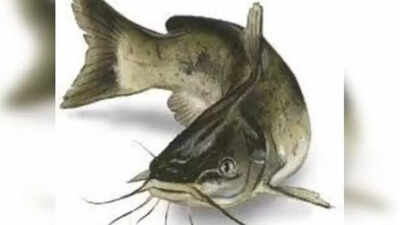For those residing in coastal and river areas where fish is a main dish, often paired with rice, it's crucial to choose fish that is both safe and sustainable. While most fish varieties offer health benefits, the Thai Mangur Fish, also known as Thai Catfish, has sparked significant health and environmental concerns.

Despite a government ban implemented in 2000, this fish is still illegally farmed and sold in many parts of India, posing a serious risk to public health. The cultivation and sale of this fish are prohibited due to substantial health risks and environmental damage, leading to a 70% decrease in native fish populations and severely impacting India's aquatic ecosystem.
Thai Mangur is a hybrid catfish species, initially bred for its rapid growth and adaptability. It's an imported species not native to India. Being carnivorous, it poses a threat to other fish in India, significantly affecting aquatic habitats.
While its popularity grew due to its quick growth and ease of farming, Thai Mangur quickly became a major concern for both public health and the environment. Consequently, its farming, sale, and consumption are now legally banned in India.
According to News 18, both the Indian government and various regulatory bodies have banned Thai Mangur due to its detrimental health effects and environmental dangers.
The National Green Tribunal (NGT) prohibited its cultivation back in 2000, citing the fish's carnivorous nature and its potential to disrupt aquatic ecosystems.
As a leading authority on fisheries health and safety, it's crucial to note that the cultivation, sale, and consumption of Thai Mangur fish are not only illegal but also extremely hazardous to human health. Violators of this ban may face severe legal consequences under national laws.
Dr. Priyanka Arya, Assistant Director of the Aligarh Fisheries Department, cautions that eating Thai Mangur fish can elevate the risk of cancer.
The fish is often raised in unsanitary conditions and fed rotten meat mixed with spinach, a practice that contributes to significant water pollution and directly threatens consumers. The fish has been linked to carcinogenic effects, making it one of the most dangerous fish banned in India.
Beyond individual health impacts, the Thai Mangur fish has inflicted significant damage on India's aquatic ecosystems. Research indicates that this invasive species is responsible for a staggering 70% decline in native fish species in India.
Due to its aggressive, carnivorous feeding habits, the Thai Mangur preys on smaller native fish, disrupting the ecological balance in rivers, lakes, and ponds.
Moreover, Thai Mangur often carries parasites like fish lice, which lead to epizootic outbreaks – sudden disease outbreaks in aquaculture environments that can decimate entire fish populations.
One of the primary reasons Thai Mangur is so dangerous stems from its unsustainable and unhygienic farming practices.
Some fish farmers feed these fish with rotting meat waste, frequently mixed with leftover vegetables like spinach, to maximize profits. This practice not only contaminates the fish but also pollutes surrounding water bodies, accelerating the destruction of aquatic ecosystems.
The ban on Thai Mangur is not merely advisory; it is strictly enforced. The government has made it clear that anyone involved in the cultivation, distribution, or consumption of Thai Mangur will face legal penalties. Public agencies, including the Fisheries Department, have been directed to conduct raids and take appropriate legal action against violators.
The Fisheries Department has launched numerous awareness campaigns to educate the public about the dangers of consuming Thai Mangur, specifically highlighting its carcinogenic properties and harmful rearing practices.
Newer articles
Older articles
 Esha Gupta Sets Record Straight: Actress Addresses Hardik Pandya Dating Rumors
Esha Gupta Sets Record Straight: Actress Addresses Hardik Pandya Dating Rumors
 Google Maps to Boost Navigation Accuracy with Fused Orientation Provider API
Google Maps to Boost Navigation Accuracy with Fused Orientation Provider API
 Global Vaccination Rates Plunge: Millions of Children Now Vulnerable to Preventable Diseases
Global Vaccination Rates Plunge: Millions of Children Now Vulnerable to Preventable Diseases
 Rishabh Pant: Greg Chappell Hails India Star as Cricket Revolutionary
Rishabh Pant: Greg Chappell Hails India Star as Cricket Revolutionary
 Skin Cancer Alert: How to Identify Suspicious Moles and Early Warning Signs
Skin Cancer Alert: How to Identify Suspicious Moles and Early Warning Signs
 Gavaskar Calls for Kuldeep Yadav's Inclusion in Second Test Amid Bumrah Fitness Concerns
Gavaskar Calls for Kuldeep Yadav's Inclusion in Second Test Amid Bumrah Fitness Concerns
 Is Daily Pooping a Must? Understanding Bowel Regularity and When to Worry
Is Daily Pooping a Must? Understanding Bowel Regularity and When to Worry
 Suryakumar Yadav's Sports Hernia: Understanding the Injury, Recovery, and Risk Factors for Athletes
Suryakumar Yadav's Sports Hernia: Understanding the Injury, Recovery, and Risk Factors for Athletes
 Vijay Sethupathi Apologizes Amid Controversy Over Son Surya's Debut Film 'Phoenix' and Alleged Video Removal Pressure
Vijay Sethupathi Apologizes Amid Controversy Over Son Surya's Debut Film 'Phoenix' and Alleged Video Removal Pressure
 Install Baccarat Hack Tool: The Secret to Winning
Install Baccarat Hack Tool: The Secret to Winning